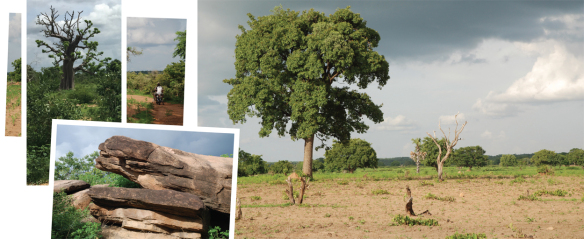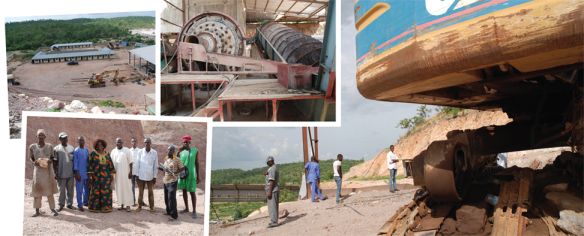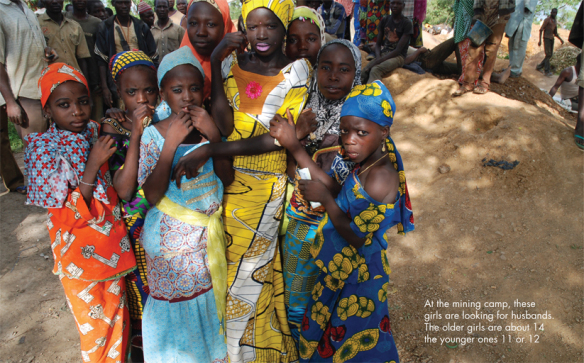The sun is high as we weave slowly down an axle breaking dirt road into the bush. After every obstacle, our man looks round to check our progress and waits for us to catch up. On either side of us the pink granite-like rocks glitter as the sun catches them. The leafy green bushes are interspersed with small trees of various shapes, and as always I keep an eye out for birds. The track rises through the high ground and down into a flatter plain where small scale agriculture again dominates. Over to our right, people are gathered in the deep shade of the low trees, and we wait briefly while the site engineer is found and advised of our arrival.
We arrive at the mine, and while we wait for the engineer following, it is a relief to sit in the shade and feel a slight breeze. We enter through the gates and as it is Sunday, no-one is working. There are Chinese workers here, and they are taking delivery of their bottled water supply. Looks like enough for a month, though in this heat, perhaps not.
“Welcom from Ingaland” shouts the loud and curious security guard with the Kalashnikov. After brief introductions, our mini tour begins. We pile back into the pick ups and drive the short distance up the hill from the compound. It’s too hot and too steep to walk.

Our tour guide, the mine engineer, is from Cameroon and studied in Belgium, he says.
We are looking at a large, dynamited water filled crater, where serious operations began only a year ago. Back down the slope, we are shown the massive machines that break up the rocks and the whole process is explained in Pidgin English and a little Hausa. The view from here is spectacular, with mile after mile of green wooded hills as far as the eye can see, and so I think about this site in context of the landscape. I could describe it simply as a large hole in the ground, a blot on the landscape, surrounded by derelict equipment and broken vehicles, but that would be unkind. The people that are showing us around are visibly proud of what has been achieved here, the 24 hour operation recently hitting the vein of gold. Unfortunately container loads of unprocessed rubble holding gold and whatever else within regularly leave for further processing in China, something the new government would like to change.
As we leave, the security guard again cheerfully shouts “Welcom from England.” I smile and wave convinced I’ve made a new friend, should I ever pass this way again.
Another slow drive along the trail leads us to the mining camp. The river to the left is running at a trickle through the grassy clearings and shrubby thickets, with deeper pools spread out across the bed of pink sand and boulders. Picturesque is the word that comes to mind, even though we are in a harsh and obviously unforgiving environment.
It is mid afternoon as we arrive at the camp. There are dozens of young men here gathered under the trees. Cooking pots and fires, machines and tarps are dotted around, but there is no mining machinery here as yet. Many men carry long machetes.
Advanced word has been given of our visit as everyone is paying attention except for one or two who are lying down out for the count – there is an amount of weed smoking and glue sniffing here. Some young girls from local villages are selling food and cooking for the men. Staying close to home and with little or no ‘education’ these girls are hoping to find a husband here, something of a cultural imperative, then. The makeup they are wearing shows that they are available. The eldest is barely 14.

Jumoke gets an update from the young graduate who supervises the site, while we take photos. There is a lawless atmosphere here, and the young men digging in the dirt all know the risks they take. For instance, just feet away from the gathering are hand dug holes in the ground that looked to be several metres deep – I couldn’t see the bottom. A definite hazard even in daylight, I dread to think what can happen here at night.
We leave later than planned, and as the sun casts long shadows across the crops, I watch all black, red eyed fork-tailed drongos flying off from low perches to catch insects, my thoughts turning to the obvious and stark culture differences I’m seeing on this trip. There will be more. The long straight roads back to Kebbi are in good enough condition for Sanusi to speed along at a reasonable lick, travelling at night here has it’s own dangers. Making allowances for other road users with no lights, too much light, and Fulani cattle herders, we arrive safely back in Kebbi just after dark. I’ve not had many days like this one.